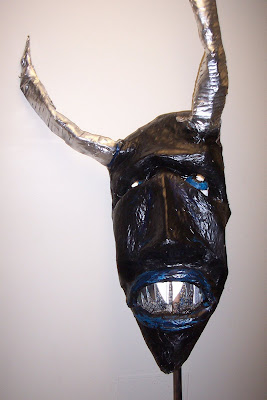i have been reading Zizek on enjoyment lately. He writes: "The external law regulates pleasure in order to deliver us from the superegotistical imposition of enjoyment which threatens to overflow our daily life. Carpe diem, enjoy the day, consume the surplus-enjoyment procured by your daily sacrificing--there is the condensed formula of 'totalitarianism.'" Here, enjoyment involves a notion of surplus. I have always had a really hard time thinking about surplus, in Marx as well as as a remainder, an excess, or as something that exceeds a particular system, and a hard time thinking about this surplus as the material. So I wonder what things Zizek assumes when he assumes the existence of this remainder, and what things can remain untheorized if this is the governing construct of materiality. In another passage, he makes clearer the distinction between pleasure and enjoyment. He writes:
"And it is precisely at this level that the opposition of pleasure and enjoyment is to be located: a simple illicit love affair without risk concerns mere pleasure, whereas an affair which is experienced as a "challenge to the gallows"--as an act of transgression--procures enjoyment; enjoyment is the "surplus" that comes from our knowledge that our pleasure involves the thrill of entering a forbidden domain--that is to say, that our pleasure involves a certain displeasure."
Enjoyment involves desiring that which might also be threatening to us, or this is Zizek's rationale and explanation for the phenomenon of totalitarianism, something that he theorizes as the disappearance of a distance between the external law and the internal moral law, or between knowledge and belief. The distinctions here raise some questions, namely: is pleasure so innocent? And, correspondingly, is knowledge ever so certain (and belief) that they remain fixed poles between which a difference could be measured?
photo: Mask for production of Dead Souls, Evan Williams

2 comments:
It goes with the really strange relation to Lacan throughout, and finally beyond Lacan to almost everything, in which what Lacan meant (by "surplus," e.g.) is never posed as a question, although views that are in fact interpretations are given out as facts. That there was or had been a question at one point never gets acknowledged. Who has ever written this way? it's not like Lacan wrote this way about Freud, or Althusser wrote this way about Marx, or Balibar about Althusser, etc....
it's effective, though. ;)
Post a Comment